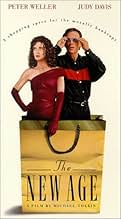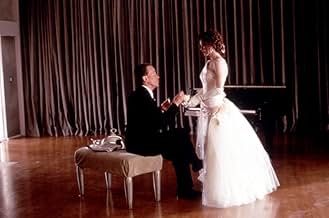IMDb-BEWERTUNG
5,6/10
1348
IHRE BEWERTUNG
Peter und Katherine gehören zu den Privilegierten von Los Angeles. Sie sind reich, kaufen was sie wollen und sind unheimlich trendy. Als die beiden ihre Jobs verlieren scheint es vorbei mit ... Alles lesenPeter und Katherine gehören zu den Privilegierten von Los Angeles. Sie sind reich, kaufen was sie wollen und sind unheimlich trendy. Als die beiden ihre Jobs verlieren scheint es vorbei mit der glücklichen Welt...Peter und Katherine gehören zu den Privilegierten von Los Angeles. Sie sind reich, kaufen was sie wollen und sind unheimlich trendy. Als die beiden ihre Jobs verlieren scheint es vorbei mit der glücklichen Welt...
- Auszeichnungen
- 1 wins total
Empfohlene Bewertungen
This film was a complete surprise to me. It's clever, funny and very thought-provoking. Judy Davis and Peter Weller (that man is underrated) both deliver excellent performances. A warning: The ending isn't quite the usual happy salvation, but it really does hit the perfect note on one of the main themes of the film: You can't always get what you want. And pushing that very feeling to the viewer just before the credits is perhaps the cleverest thing about the whole film.
Writer-director Michael Tolkin, whose 1991 film "The Rapture" was one of the best films of its year, let his talents go to waste with this absurd comedy of lost morals. A graphic designer and her Hollywood honcho husband are in big financial trouble: she has no clients and he just quit his job. Some of their survival solutions are quirky and interesting, but the characters are off-base right from the start. Tolkin is the new Sidney Lumet: everyone screams irrationally at everyone else, but it's tough discerning whether or not we're supposed to laugh at these banal verbal matches, often from opposite ends of the swimming pool! The leads present another problem: Judy Davis and Peter Weller are brilliant actors, yet they can't work up any semblance of chemistry together as this high-powered married couple on a tightrope. A few of their marital predicaments are worked out amusingly (they separate within the house, and date others), but their jealousies and insecurities are a bore. Tolkin (also the screenwriter of "The Player") pretends to know these people (he's pseudo-hip). It would be to his ultimate advantage if he broadened his horizons...maybe it's time he left L. A. and make some new friends? *1/2 from ****
"The New Age" is half fascinating and half dull. It's very much a comedy, albeit a very dark and satirical one. But it's emotionally distant, and has the distinct sense of being a film about rich people made for and by other rich people. It's about a world with a built-in sense of the ridiculous in the everyday, so much so that it's hard to know what's meant to make us laugh and what's designed to reflect real life. The leads are good. Peter Weller and Judy Davis disappear into their characters, Davis to the point I really didn't recognize her. The best and most entertaining part of the film is Samuel L. Jackson's cameo, and the scenes directly relating to it.
Michael Tolkin's script has a lot of depth, but his direction doesn't. He films what happens, but without any real understanding of how to stage it. "The New Age" is a visually flat film, and looks like just about every average film from 1994. Which is to say, pretty dull. But, in the end, the script lifts the film up enough to be interesting in passing. I don't regret having seen this.
Michael Tolkin's script has a lot of depth, but his direction doesn't. He films what happens, but without any real understanding of how to stage it. "The New Age" is a visually flat film, and looks like just about every average film from 1994. Which is to say, pretty dull. But, in the end, the script lifts the film up enough to be interesting in passing. I don't regret having seen this.
The previous reviewer's comments mysteriously do not allude to the terrific humor of this film. It is a clever, understated, totally deadpan comedy. If you like black, dry humor, this film is for you. At the same time it skewers the vapidly self-affirming culture of the wealthy, new age set. Slowly, Peter Weller and Judy Davis's characters' natures are purified in the furnace of self-destruction, until they discover their true selves -- mediocrity and greed, which lately pretended to be new age spirituality. A succession of fatuous gurus pushes them down the slope of destruction, until finally Samuel Jackson, in a fabulous cameo, teaches Peter Weller how to attain ultimate truth through techniques of visualization. By this point, the Davis-Weller characters have lost their jobs, their wealth, their "friends", their home, their failed business, and their relationship (did I mention the affairs?), and, perhaps, all illusions that there was anything at their core.
With the exception of one or two scenes, everything in this film is deliciously subtle and understated, but all the more wickedly funny for it. You might not realize how good it is at first. A second viewing will really help your appreciation of it.
If this film doesn't make you laugh, grasshopper, then perhaps you still do not know yourself.
With the exception of one or two scenes, everything in this film is deliciously subtle and understated, but all the more wickedly funny for it. You might not realize how good it is at first. A second viewing will really help your appreciation of it.
If this film doesn't make you laugh, grasshopper, then perhaps you still do not know yourself.
The response to this film was a little more negative than I expected. I liked the film better than Tolkin's "The Rapture." It's one of my favorites to watch for non-serious viewing.
The film has a quirkiness, even a spookiness, that, apparently, many dislike and don't understand. I wanted to recount the plot; however, since that's not desired, I don't see why other reviewers think the plot is so implausible.
Peter Weller's and Judy Davis' characters seem to be mismatched partners, but is that so implausible? This dissonance was probably intended, but disliked by many viewers. Anyway, the main characters compromise themselves in many ways: I think Peter and Judy do well in the movie.
I also like Adam West in his small part, and the under-rated Patrick Bachau plays his part as a new-age guru with urbane spookiness. Corbin Bernsen has a small part at the beginning as the boss for Peter Weller's character (Weller's character is conveniently named "Peter.")
Finally, I like the depictions of certain new-age ceremonies and personalities--this is rare in movies.... I think the movie is thoughtful. It does not have much action, but don't most action films today flagrantly violate the law of "suspension of disbelief?"
This film will not be liked by the multitude in America with the attention span of a gnat.
The film has a quirkiness, even a spookiness, that, apparently, many dislike and don't understand. I wanted to recount the plot; however, since that's not desired, I don't see why other reviewers think the plot is so implausible.
Peter Weller's and Judy Davis' characters seem to be mismatched partners, but is that so implausible? This dissonance was probably intended, but disliked by many viewers. Anyway, the main characters compromise themselves in many ways: I think Peter and Judy do well in the movie.
I also like Adam West in his small part, and the under-rated Patrick Bachau plays his part as a new-age guru with urbane spookiness. Corbin Bernsen has a small part at the beginning as the boss for Peter Weller's character (Weller's character is conveniently named "Peter.")
Finally, I like the depictions of certain new-age ceremonies and personalities--this is rare in movies.... I think the movie is thoughtful. It does not have much action, but don't most action films today flagrantly violate the law of "suspension of disbelief?"
This film will not be liked by the multitude in America with the attention span of a gnat.
Wusstest du schon
- WissenswertesWas #9 on Roger Ebert's list of the Best Films of 1994.
- Zitate
Peter Witner: Did you know that in Chinese the word for "crisis" is the same as the word for "opportunity"?
- VerbindungenFeatured in Siskel & Ebert & the Movies: Why Gump? Why Now? (1994)
Top-Auswahl
Melde dich zum Bewerten an und greife auf die Watchlist für personalisierte Empfehlungen zu.
- How long is The New Age?Powered by Alexa
Details
Box Office
- Bruttoertrag in den USA und Kanada
- 245.217 $
- Eröffnungswochenende in den USA und in Kanada
- 35.797 $
- 18. Sept. 1994
- Weltweiter Bruttoertrag
- 245.217 $
- Laufzeit
- 1 Std. 52 Min.(112 min)
- Sound-Mix
- Seitenverhältnis
- 1.85 : 1
Zu dieser Seite beitragen
Bearbeitung vorschlagen oder fehlenden Inhalt hinzufügen




































